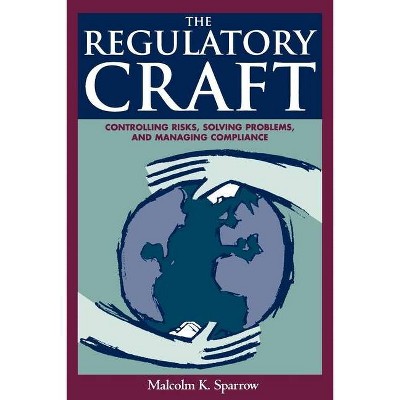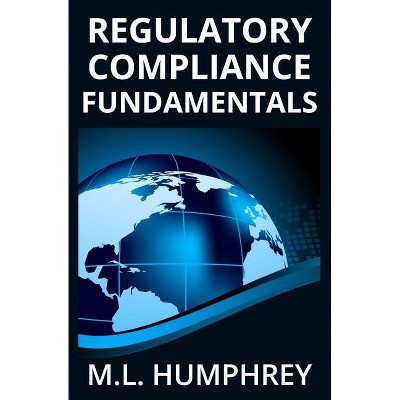The Regulatory Craft - by Malcolm K Sparrow (Paperback)

Similar Products
Products of same category from the store
AllProduct info
<p/><br></br><p><b> About the Book </b></p></br></br><p>A Brookings Institution Press and the Council for Excellence in Government publication</p><p><i>The Regulatory Craft</i> tackles one of the most pressing public policy issues of our time--the reform of regulatory and enforcement practice. Malcolm K. Sparrow shows how the vogue prescriptions for reform (centered on concepts of customer service and process improvement) fail to take account of the distinctive character of regulatory responsibilities--which involve the delivery of obligations rather than just services. In order to construct more balanced prescriptions for reform, Sparrow invites us to reconsider the central purpose of social regulation--the abatement or control of risks to society. He recounts the experiences of pioneering agencies that have confronted the risk-control challenge directly, developing operational capacities for specifying risk-concentrations, problem areas, or patterns of noncompliance, and then designing interventions tailored to each problem. At the heart of a new regulatory craftsmanship, according to Sparrow, lies the central notion, "pick important problems and fix them." This beguilingly simple idea turns out to present enormously complex implementation challenges and carries with it profound consequences for the way regulators organize their work, manage their discretion, and report their performance. Although the book is primarily aimed at regulatory and law-enforcement practitioners, it will also be invaluable for legislators, overseers, and others who care about the nature and quality of regulatory practice, and who want to know what kind of performance to demand from regulators and how it might be delivered. It stresses the enormous benefit to society that might accrue from development of the risk-control art as a core professional skill for regulators.</p><p/><br></br><p><b> Book Synopsis </b></p></br></br><p><i>The Regulatory Craft</i> tackles one of the most pressing public policy issues of our time--the reform of regulatory and enforcement practice. Malcolm K. Sparrow shows how the vogue prescriptions for reform (centered on concepts of customer service and process improvement) fail to take account of the distinctive character of regulatory responsibilities--which involve the delivery of obligations rather than just services.In order to construct more balanced prescriptions for reform, Sparrow invites us to reconsider the central purpose of social regulation--the abatement or control of risks to society. He recounts the experiences of pioneering agencies that have confronted the risk-control challenge directly, developing operational capacities for specifying risk-concentrations, problem areas, or patterns of noncompliance, and then designing interventions tailored to each problem.</p><p>At the heart of a new regulatory craftsmanship, according to Sparrow, lies the central notion, pick important problems and fix them. This beguilingly simple idea turns out to present enormously complex implementation challenges and carries with it profound consequences for the way regulators organize their work, manage their discretion, and report their performance. Although the book is primarily aimed at regulatory and law-enforcement practitioners, it will also be invaluable for legislators, overseers, and others who care about the nature and quality of regulatory practice, and who want to know what kind of performance to demand from regulators and how it might be delivered. It stresses the enormous benefit to society that might accrue from development of the risk-control art as a core professional skill for regulators.</p><p/><br></br><p><b> Review Quotes </b></p></br></br><br><P>"Every member of the Bar Association, as well as every government enforcement attorney, inspector and program manage should read this book." -- "NTSB newsletter"<br><br><P>"In this volume (Sparrow) offers a fresh perspective on regulatory reform.... Sparrow's approach to regulation and enforcement is designed to satisfy the 'bean counters' and those genuinely interested in achieving results in public programs.... useful for readers concerned about bureaucratic discretion and accountability and those interested in improving government performance in other kinds of agencies and in other countries. The message is important, and it is well delivered." --William L. Waugh Jr., Georgia State University, "Perspectives on Political Science", 12/1/2001<br><br><P>"Malcolm Sparrow presents a positive, almost affectionate, portrayal of regulation and the beleaguered administrators charged with its implementation.... scholars and practitioners alike should find this book provocative, insightful, and perhaps even inspiring." --Thomas W. Church, State University of New York in Albany, "American Political Science Review, Vol. 95, No. 3", 9/1/2001<br><p/><br></br><p><b> About the Author </b></p></br></br><p><b>Malcolm K. Sparrow</b> is Professor of the Practice of Public Management at the John F. Kennedy School of Government, Harvard University. He is Faculty Chair of the School's Executive Programs on regulation and enforcement, corruption control, policing, and counter-terrorism.</p>
Price History
Cheapest price in the interval: 26.99 on October 22, 2021
Most expensive price in the interval: 26.99 on December 20, 2021
Price Archive shows prices from various stores, lets you see history and find the cheapest. There is no actual sale on the website. For all support, inquiry and suggestion messages communication@pricearchive.us




















